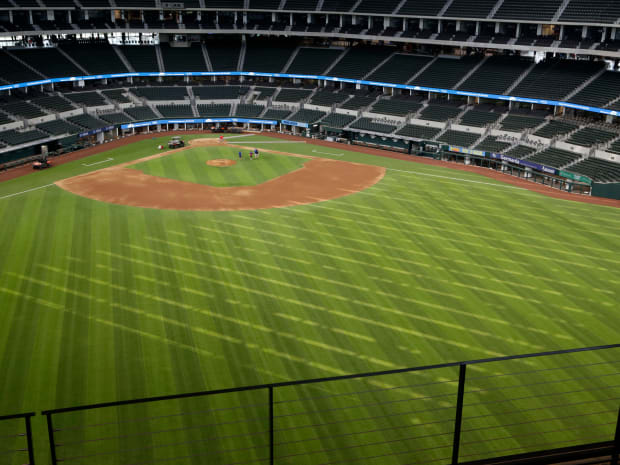MLB finally has a plan to play in 2020, but how much does that mean as the virus rages on?
The 30 Major League Baseball owners want to play 60 games this year. The players want to play 70. Here’s a better idea: How about 0?
On Monday afternoon, the players voted against the owners’ most recent proposal, leaving it to commissioner Rob Manfred to mandate a season. He will likely try to set a schedule of 50 or so games. It doesn’t matter. This isn’t safe anymore. It probably never was.
Many of us have been distracted in recent days by calculating teams’ EBITDA when we should have been calculating states’ coronavirus case rates. I wrote last week that the owners are being intransigent. They are. But the news on Friday of COVID-19 outbreaks in Phillies camp, in Clearwater, Fla.; and in Blue Jays camp, in Dunedin, Fla.; and in Giants camp, in Scottsdale, Ariz., have made it clear: The labor issue is not the problem. The virus is.
This was supposed to be the easy part. Only a handful of players have reported to spring training facilities, and they are not yet playing games. All the teams had to do was test players and staff a few times upon arrival and then keep them isolated. And yet here we are, with all 30 camps shut down as the league tries to formulate a consistent testing protocol. That’s right: The league and the union have spent three months arguing over money. The teams have opened their facilities. And yet they still lack a consistent testing protocol.
Sports are a treat you get when you live in a functioning society. We do not live in a functioning society. We live in a society in which more than 118,000 people have died of COVID-19, the curves are pointed upward … and states are responding by reopening.
One of MLB’s early plans called for it to stage the season in a quarantine bubble of sorts—with teams either clustered in Arizona or split among Arizona, Florida and Texas. That option might have kept everyone safe. But it evaporated when players scoffed at the idea of months locked in hotels and owners decried the loss of stadium sponsorships. So they settled on the more dangerous plan of playing in their home ballparks, flying from state to state and then returning to their families—and to their local grocery stores.

Arizona, California, Florida, Georgia, Missouri, Texas and Washington all reported record highs in cases in the last two weeks. Those seven states represent the homes of 14 MLB teams—15 if the Blue Jays are unable to travel from Toronto and need to play at their spring training site in Dunedin, Fla. As bars and restaurants welcome back customers, young people have found themselves disproportionately stricken. And scientists continue to caution that we do not know what the long-term effects of this disease will be. Even people who recover are often left with lung damage, hardly ideal for a professional athlete.
The virus is not going anywhere. The discussions between the owners and the players aren’t, either. So how about this? Manfred and union head Tony Clark should cancel the season, take two weeks off and then spend the next nine months negotiating a new collective bargaining agreement to replace the one that is due to expire in December 2021. At this point, after all the leaks and counter-leaks, proposals and counter-proposals, statements and counter-statements, the sides distrust each other as much as they ever have. It’s hard to see how they will avoid a work stoppage in ’22.
Even if they scrape together a season this year, it will not feel legitimate. Some players will opt out entirely, focusing on their own health or those of their high-risk family members. Many of those who remain, especially pitchers, will be forced to decide whether to risk injury in pursuit of a World Series that will always have an asterisk attached. The joy we usually associate with the sport—the high fives after home runs, the dogpiles after walk-offs—will be banned in an attempt to keep the players safe. They won’t even be allowed to spit. And a flare-up could scuttle the whole thing at any point.
Almost no one in baseball truly believes that the players will be able to stick to a strict quarantine. The belief that you are invincible allows you to stand in the box and face 99 mph on the black. It also makes you likely to go to a bar during a pandemic. And then what? If the Phillies and the Blue Jays and the Giants are any indication, it will be nearly impossible to contain an outbreak. For months people around the sport have asked: What happens when a player tests positive? A better question would be: What happens when half a dozen players test positive?
A canceled season would affect thousands of team employees who make their livelihoods from the sport. Most of the major league players should be able to survive on the $170 million salary advance the league doled out in March. The owners, most of them billionaires, claim they would lose $640,000 for each regular season game played without fans. In that case, they can take the money they will save on major league salaries and pay everyone else.
For a few weeks in April, people in baseball were captivated by the idea of being the first sport to return. That did not happen. Maybe that was for the best. Now baseball has a chance to be the first sport to do the right thing: not play at all.